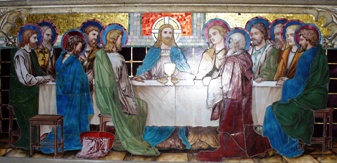Dear Friends,
When I was a teacher the joke was that teachers are always on holiday; and now that I’m a vicar people often joke – ‘but you only work on Sundays!’ This led me to wonder how much people actually know about the role of the vicar (and curate). If you are a fan of Midsummer Murders on television, you will almost always see the vicar in the church building, usually wearing a long black cassock and putting out hymn books! Or wandering around the village knocking on everyone’s door. This is a long way from the reality of modern ‘vicaring’. I admit that Sunday is usually the busiest day, (and Saturdays during the wedding season!) but there is plenty to do during the rest of the week, too. Nowadays, many vicars may have previously held another job; or some choose to continue in secular employment alongside their ministerial duties, like our Rev Sarah. These are known as Self-Supporting Ministers. However, trying to explain my role and title is almost as complicated as explaining the Rules of Cricket, so I have included some definitions at the end of this article. The most significant aspect of a vicar’s or curate’s role is that we are there for anyone in the parish, whether you are regular church-goer or not. This might be for a chat or a prayer, a bereavement visit, a wedding or christening or a hospital visit. And along with other members of the ministry team, I take Holy Communion to people at home who might be poorly or housebound. Another aspect that I enjoy is being a visible presence in the community – attending fetes, coffee mornings, afternoon teas, concerts, exhibitions and the like. This can be an excellent opportunity for good conversations and for people to make contact. There are some additional duties that come with the role, such as being a local charity trustee, and being a Foundation Governor in our local Church of England school. I love being in school weekly to take Collective Worship, and to help with RE lessons and visits to the church. In a recent survey of various types of employment that were the most rewarding and fulfilling, being a vicar came quite high up the list, and I can honestly say that although there are challenges, it is a privilege to be called to serve God and his people in these churches.
Blessings, Julia
DEFINITIONS:
Vicar A priest in the Church of England who is in charge of a church and the religious/spiritual/pastoral needs of people in a particular area.
Rector A priest in the Church of England who is in charge of a group of churches (known as a benefice). incumbent The current holder of an office or position.
Curate A person who is training to become a Vicar, Rector or Self-Supporting Minister. This training usually lasts between two to four years and can be done full-time at Theological College, part-time through a regional training course, or locally in Suffolk with our Bishops.
Deacon A curate in the first year of training.
Priest with Permission to officiate A priest who has retired from full time or self-supporting ministry, but offers additional ministerial support.
Coming next! Other roles within our churches explained: Readers, lay elders, lay pioneers or evangelists and churchwardens
PS Don’t forget you can follow us on Facebook
www.facebook.com/groups/roughamchurches

